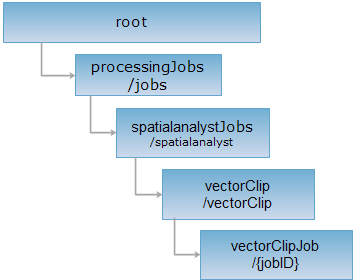<vectorClipJob_uri>/{JobID}[.<format>]
vectorClipJob resource indicates a analysis job of single object overlay. Gets the detail configuration information of single object overlay job by ID through sending GET request to vectorClipJob resource.
Supported Methods:
Supported output formats: rjson, json, html, xml.

Implement the HTTP request on the following URI, where supermapiserver is the server name, with rjson being the output format.
http://supermapiserver:8090/iserver/services/distributedanalyst/rest/v1/jobs/spatialanalyst/vectorClip/{jobID}.rjson
Gets the detail configuration information of single object overlay job.
Execute a GET request on the vectorClipJob resource. The representation structure for the returned resource is like this:
| Field | Type | Description |
| id | String | Application ID. |
| state | Jobstate | The task status. Including execution status, start time, time consuming, and so on. |
| setting | JobSetting | Lists the detail information of current task. |
Sending GET request to vectorClipJob resource http://supermapiserver:8090/iserver/services/distributedanalyst/rest/v1/jobs/spatialanalyst/vectorClip/a4d3f1c0_bd7e_4c3d_a63e_b02f76a293a9.rjson, the description for the returned rjson is:
{
"id": "a4d3f1c0_bd7e_4c3d_a63e_b02f76a293a9",
"setting": {
"DEFAULT_MASTER_ADRESS": "local[*] ",
"analyst": {
"datasetOverlay": "New_Region",
"inputOverlay": "F:\\20170608\\onere\\onere.udb",
"mode": "clip",
"numSlices": "20"
},
"appName": "vectorClip",
"args": [
"--inputSource",
"F:\\20170608\\onere\\onere.udb",
"--datasetSource",
"zone",
"--numSlices",
"20",
"--inputOverlay",
"F:\\20170608\\onere\\onere.udb",
"--datasetOverlay",
"New_Region",
"--mode",
"clip",
"--outputResult",
"F:\\20170608\\supermap_iserver_900_15008_4414_win64_zip\\webapps\\iserver\\processingResultData\\Analyst\\udbs\\fdae17ca-782b-4729-83d0-bfefb573377d",
"--datasetResult",
"analystResult"
],
"contextSetting": null,
"input": {
"datasetSource": "zone",
"inputSource": "F:\\20170608\\onere\\onere.udb"
},
"mainClass": "com.supermap.bsp.main.vectorClipMain",
"output": {
"cacheName": null,
"cacheType": null,
"datasetResult": "analystResult",
"outputResult": "F:\\20170608\\supermap_iserver_900_15008_4414_win64_zip\\webapps\\iserver\\processingResultData\\Analyst\\udbs\\fdae17ca-782b-4729-83d0-bfefb573377d"
},
"serviceInfo": {
"targetDataPath": "F:\\20170608\\supermap_iserver_900_15008_4414_win64_zip\\webapps\\iserver\\processingResultData\\Analyst\\a4d3f1c0_bd7e_4c3d_a63e_b02f76a293a9",
"targetServiceInfos": [
{
"serviceAddress": "http://localhost:8090/iserver/services/map-vectorClip2/rest",
"serviceType": "RESTMAP"
},
{
"serviceAddress": "http://localhost:8090/iserver/services/data-vectorClip2/rest",
"serviceType": "RESTDATA"
}
]
},
"serviceRoot": "http://localhost:8090/iserver/services/"
},
"state": {
"elapsedTime": 12091,
"endState": true,
"endTime": 1496911750621,
"errorMsg": null,
"errorStackTrace": null,
"publisherelapsedTime": 2804,
"runState": "FINISHED",
"startTime": 1496911733481
}
}
Asks for the response identical to the one that would correspond to a GET request, but without the response body. This is useful for retrieving meta-information written in response headers, without having to transport the entire content. The meta-information includes the media-type, content-encoding, transfer-encoding, content-length, etc.
HEAD request can be used to check if the vectorClipJob resource exists, or if the vectorClipJob resource can be accessed by clients. It can also determine if the vectorClipJob resource supports an output format <format> if performed on a URI with .<format> included.